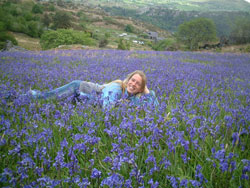Vera Thoss tells Elinor Richards about her bluebell business and research, using her car in her experiments and analysing whale vomit
Vera Thoss is an environmental chemistry lecturer at Bangor University, UK. Her research is based on ecological chemistry, which addresses processes mediated through specific compounds within ecosystems and environmental chemistry, which is concerned with the impact of human activities on the environment 
What inspired you to become a scientist?
It all started when I was 13 and I had my first chemistry lesson. I instantly took to the subject and from then my mind was made up. I was also curious and wanted to ‘understand the world’.
What projects are you working on?
Currently, my group is working on oil pollution, composting and plant-derived products. It seems a bit of a stretch but it is all part of carbon cycling: plants build precious molecules, most of the time these remain intact but may transfer into air, water or soil. Crude oil is the remnants of sunken forests. So in the end, all the chemistry comes from plants photosynthesising and creating complex fragrances, tastes and colours. It is fascinating.
What discoveries have you made during your research on bluebells?
Bluebell seeds have a high oil content and the oil has an unusual composition. Even though this is the first chemical assessment of Hyacinthoides non-scripta oil, the chemistry is not earth-shattering. The ecology aspects gave room for more discoveries, for example we found seed stores on the site, meaning that possibly voles or shrew have collected the seeds for storage. This has never been reported before.
Tell us about your bluebell conservation efforts and how your research can help.
We are hoping to show that bluebell seeds can be a source of fine chemicals. We obtain an oil of unusual composition from the seeds. The residue contains iminosugars, which may be of use in future medicines. I am hoping that the compounds isolated from bluebell seeds will be of commercial value, which in turn means that the conservation of bluebells pays for itself. We are hoping to paint the mountains and woodlands blue again.
Find out more about the Vera Bluebell farm and the BEACON and PROBECO projects in Chemistry World
Link to journal article
Triacylglycerol Composition of British Bluebell (Hyacinthoides non-scripta) Seed Oil
Vera Thoss , P J Murphy , Ray John Marriott and Thomas Wilson
RSC Adv., 2012, Accepted Manuscript, DOI: 10.1039/C2RA20090B










